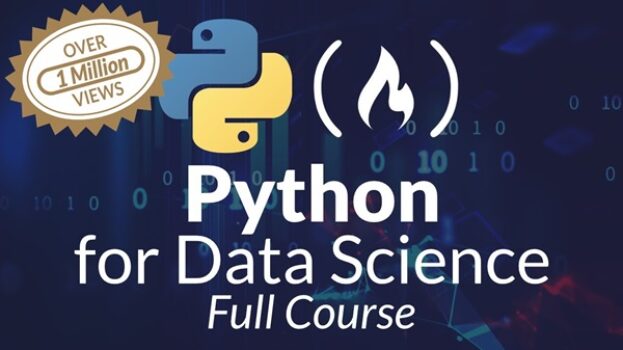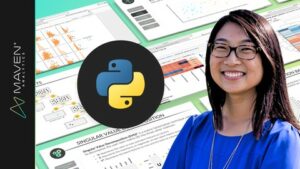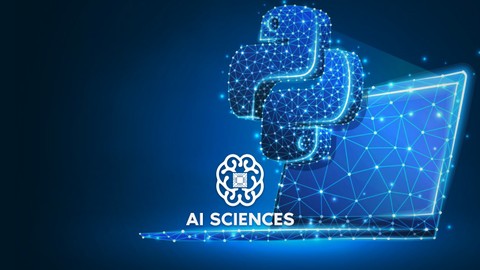Best Python for Data Science Courses
Python for Data Science Courses on Udemy – Learn Python for Data Science Online. Whether you’re just starting out or already have some experience, we offer various Python for Data Science courses designed to fit your needs. Delving deeper than general data science, our courses offer a niche focus for those seeking specialized skills for career advancement, skill acquisition, or even a new career path. Take the next step in your professional journey and enroll in Python for Data Science today!
10 Best Python for Data Science Courses on Udemy (2025)
Data Science in Python: Unsupervised Learning
Data Science in Python: Unsupervised Learning
This is a hands-on, project-based course designed to help you master the foundations for unsupervised learning in Python. We’ll start by reviewing the data science workflow, discussing the techniques & applications of unsupervised learning, and walking through the data prep steps required for modeling. You’ll learn how to set the correct row granularity for modeling, apply feature engineering techniques, select relevant features, and scale your data using normalization and standardization.
Python A-Z™: Python For Data Science With Real Exercises!
Python A-Z™: Python For Data Science With Real Exercises!
Learn Python Programming by doing! There are lots of Python courses and lectures out there. However, Python has a very steep learning curve and students often get overwhelmed. This Python For Data Science With Real Exercises! course is different! This course is truly step-by-step. In every new tutorial we build on what had already learned and move one extra step forward. After every video you learn a new valuable concept that you can apply right away. And the best part is that you learn through live examples.
This Python For Data Science With Real Exercises! training is packed with real-life analytical challenges which you will learn to solve. Some of these we will solve together, some you will have as homework exercises. In summary, this course has been designed for all skill levels and even if you have no programming or statistical background you will be successful in this course!
ChatGPT for Python Data Science and Machine Learning
ChatGPT for Python Data Science and Machine Learning
Welcome to the first Data Science and Machine Learning course with ChatGPT. Learn how to use ChatGPT to master complex Data Science and Machine Learning real-life projects in no time! Real-world Data Science and Machine Learning projects require a solid background in advanced statistics and Data Analytics. And it would be best if you were a proficient Python Coder. Do you want to learn how to master complex Data Science projects without the need to study and master all the required basics (which takes dozens if not hundreds of hours)? Then this is the perfect ChatGPT for Python Data Science and Machine Learning course for you!
Machine Learning, Data Science and Generative AI with Python
Machine Learning, Data Science and Generative AI with Python
Machine Learning and artificial intelligence (AI) is everywhere; if you want to know how companies like Google, Amazon, and even Udemy extract meaning and insights from massive data sets, this Machine Learning, Data Science and Generative AI with Python course will give you the fundamentals you need. Data Scientists enjoy one of the top-paying jobs, with an average salary of $120,000 according to Glassdoor and Indeed. That’s just the average! And it’s not just about money – it’s interesting work too!
One Week of Data Science in Python – New 2025!
One Week of Data Science in Python – New 2025!
Do you want to Learn Data Science and build powerful applications Quickly and Efficiently? Are you an absolute beginner who want to break into Data Science and looking for a course that includes all the basics you need? Are you a busy aspiring entrepreneur who wants to maximize business revenues and reduce costs with Data Science but don’t have the time to get there quickly and efficiently? If the answer is yes to any of these questions, then this One Week of Data Science in Python – New 2024! course is for you!
The Complete Pandas Bootcamp 2025: Data Science with Python
The Complete Pandas Bootcamp 2025: Data Science with Python
The world is getting more and more data-driven. Data Scientists are gaining ground with $100k+ salaries. It´s time to switch from soapbox cars (spreadsheet software like Excel) to High Tuned Racing Cars (Pandas)!
Python is a great platform/environment for Data Science with powerful Tools for Science, Statistics, Finance, and Machine Learning. The Pandas Library is the Heart of Python Data Science. Pandas enables you to import, clean, join/merge/concatenate, manipulate, and deeply understand your Data and finally prepare/process Data for further Statistical Analysis, Machine Learning, or Data Presentation. In reality, all of these tasks require a high proficiency in Pandas! Data Scientists typically spend up to 85% of their time manipulating Data in Pandas.
Data Science in Python: Regression & Forecasting
Data Science in Python: Regression & Forecasting
This is a hands-on, project-based Data Science in Python: Regression & Forecasting course designed to help you master the foundations for regression analysis in Python. We’ll start by reviewing the data science workflow, discussing the primary goals & types of regression analysis, and do a deep dive into the regression modeling steps we’ll be using throughout the course.
Python Data Science with Pandas: Master 12 Advanced Projects
Python Data Science with Pandas: Master 12 Advanced Projects
Welcome to the first advanced and project-based Pandas Data Science Course! This Course starts where many other courses end: You can write some Pandas code but you are still struggling with real-world Projects because Real-World Data is typically not provided in a single or a few text/excel files -> more advanced Data Importing Techniques are required. Real-World Data is large, unstructured, nested and unclean -> more advanced Data Manipulation and Data Analysis/Visualization Techniques are required. many easy-to-use Pandas methods work best with relatively small and clean Datasets -> real-world Datasets require more General Code (incorporating other Libraries/Modules) No matter if you need excellent Pandas skills for Data Analysis, Machine Learning or Finance purposes, this is the right Course for you to get your skills to Expert Level! Master your real-world Projects!
Data Science in Python: Data Prep & EDA
Data Science in Python: Data Prep & EDA
This is a hands-on, project-based course designed to help you master the core building blocks of Python for data science. We’ll start by introducing the fields of data science and machine learning, discussing the difference between supervised and unsupervised learning, and reviewing the data science workflow we’ll be using throughout the course.
From there we’ll do a deep dive into the data prep & EDA steps of the workflow. You’ll learn how to scope a data science project, use Pandas to gather data from multiple sources and handle common data cleaning issues, and perform exploratory data analysis using techniques like filtering, grouping, and visualizing data.
Python for Data Science and Data Analysis
Python for Data Science and Data Analysis
A comprehensive course that will teach you how to use the power of Python to solve real-world data science and data analysis problems. Welcome to Mastering Python for Data Science & Data Analysis! This real-time actionable course is suitable for all skill levels. A programming or statistical background is not mandatory for you to be successful in this course. But you learn Python best by doing. That’s the reason you have a series of mini projects in this course.
This course will enable you to build a Data Science foundation, whether you have basic Python skills or not. The code-along and well planned-out exercises will make you comfortable with the Python syntax right from the outset. At the end of this short course, you’ll be proficient in the fundamentals of Python programming for Data Science and Data Analysis.
Frequently Asked Questions about Python For Data Science
What is Python for Data Science?
Python is an open-source programming language used in data science that’s noted for its beginner-friendly language and versatility. This popular coding language integrates well with multiple software components and works across multiple platforms, such as Windows, Mac, and Linux. It also has an impressive community of support and libraries available for programmers. The programming language has a strong following, with 8.2 million developers around the world, according to ZDNet.
Why learn Python for Data Science?
Learning Python for data science can be beneficial because it’s used in many data science applications. The program is popular because it tends to be easy to learn, and the simplicity of the language makes it possible to write code faster and with fewer lines than you need to use in other coding languages. When you learn Python, you may develop a deeper understanding of the methodologies used to collect and analyze data, which can lead to additional interests and career opportunities.
What are typical careers that use Python for Data Science?
Typical data science careers that use Python are data analysts, software engineers, developers, and network engineers. However, you don’t have to be a coder or developer to benefit from learning Python. Understanding Python can be beneficial to a variety of individuals who work with data, including mathematicians, researchers, accountants, marketers, and product managers.
How can taking online courses help me learn Python for Data Science?
Through online courses, you can learn the fundamentals of Python and its applications in the field of data science. Some courses show you how to write code in Python, and others explore how to use the language Python to mine data faster and create data visualizations. Lessons may cover topics like Python Extension Libraries, data manipulation in Python, and model development.
This FAQ content has been made available for informational purposes only. Learners are advised to conduct additional research to ensure that courses and other credentials pursued meet their personal, professional, and financial goals.


















